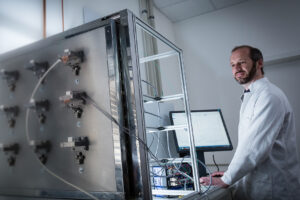Long-term tests practically used to characterize the material behavior of copper materials are only limitedly suitable for identifying reliable input data for CAE applications such as the Finite Element Method (FEM). However, due to increasing demands on copper components, such as used in electrical connectors, more precise knowledge about this input data is essential for a safe and resource-efficient component design. Therefore, it was the aim of this project to develop a method for determining material parameters for copper materials from long-term tests based on the ASTM standard [AST13] in an economic way. The determined parameters are supposed to describe the analyzed copper materials more precisely and are usable directly as input for simulation-based component design.
Within the project, it was assumed that a unique relationship between the measured parameters of the ASTM tests (e.g. cantilever tests) and the time- and temperature-dependent properties of copper materials is existing. This relationship, however, cannot be directly determined from these tests. Instead, it was the aim to determine this relationship based on numerical methods and machine learning techniques. To obtain the necessary experimental data, a suitable test setup was developed. This enabled inferring the time- and temperature-dependent material behavior or model parameters for a selected material model directly and cost-efficiently from the measured quantities of an ASTM test.
The benefit of the project is that significantly more precise information about the long-term behavior of copper materials can be obtained from already established standard tests without increasing the experimental effort. SMEs can use the results as direct input for CAE applications. In addition, SMEs can design components more cost and resource-efficient using a description of the material behavior, which is more accurate as it was before. The results of this project can be transferred to other materials, for which the long-term behavior is also relevant.
Haben wir Ihr Interesse geweckt? Unsere Expertin Karin Pfeffer freut sich auf Ihre Kontaktaufnahme!
Acknowledgement
The IGF project 21114 N of the Research Association for the Research Institute for Precious Metals and Metal Chemistry (fem) was funded by the Federal Ministry of Economic Affairs and Climate Action through the AIF within the framework of the Programme for the Promotion of Industrial Cooperative Research (IGF) based on a resolution of the German Bundestag.



